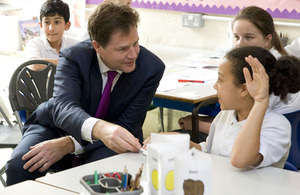Free school lunch for every child in infant school
Nick Clegg announces free school lunch for every child in state-funded infant school and disadvantaged students in further education.

Deputy Prime Minister Nick Clegg visiting a primary school
Every child in reception, year 1 and year 2 in state-funded schools will receive a free school lunch from September 2014, Deputy Prime Minister Nick Clegg has announced.
The government will fund schools in England to provide every child in reception, year 1 and year 2 with a hot, nutritious meal at lunch time. The aim is to improve academic attainment and save families money – over the course of a year the average family spends £437 on school lunches per child.
Free school meals for children in the first 3 years of school began on 2 September 2014. View infographics showing the benefits of a healthy school lunch.
Universal free school meals for primary school pupils were a key recommendation in a recent review of school food produced independently for the Department for Education. The review found that, in pilots where all children have been given a free school dinner, students were academically months ahead of their peers elsewhere and more likely to eat vegetables at lunchtime instead of less healthy food like crisps.
At the same time, the government will extend free school meals to disadvantaged students in further education and sixth form colleges. Free school meals are currently available only for eligible students at school sixth forms.
Deputy Prime Minister Nick Clegg said:
My ambition is that every primary school pupil should be able to sit down to a hot, healthy lunch with their class mates every day.
Millions of parents across the country are feeling the squeeze. Over the course of a year families spend over £400 lunch money for each child. I am determined to do all we can to help put money back in the pockets of these families.
We will start with infant school pupils because teaching healthy habits young, and boosting attainment early, will bring the biggest benefits.
Universal free school meals will help give every child the chance in life that they deserve, building a stronger economy and fairer society.
The School Food Plan, published by Henry Dimbleby and John Vincent in July this year, recommended that government embark on a phased roll out of free school meals for all children in all primary schools. The School Food Plan presented evidence that this would lead to positive improvements in health, attainment and social cohesion, and help families with the cost of living:
- the average school meal costs parents £437 per child per year
- many children on low incomes are not eligible for free school meals – approximately 4 in 10 children living in poverty
In pilot areas:
- students were found to be on average 2 months ahead of their peers elsewhere
- around 2% more children reached target levels in Maths and English at Key Stage 1; while at Key Stage 2 the impact on achievement of between 3% and 5% was a bigger improvement than the 3.6% boost that followed the introduction of a compulsory literacy hour in 1998
- academic improvements were most marked among children from less affluent families
- there was a 23% increase in the number of children eating vegetables at lunch and an 18% drop in those eating crisps
Notes to editors
All infant school pupils in state funded schools in England will be eligible for a free school meal from September 2014. Disadvantaged students at sixth form colleges and further education colleges will also be eligible for free school meals from September 2014.
These 2 measures will cost approximately £600 million. However, full details on funding will be announced in the Autumn Statement 2013.